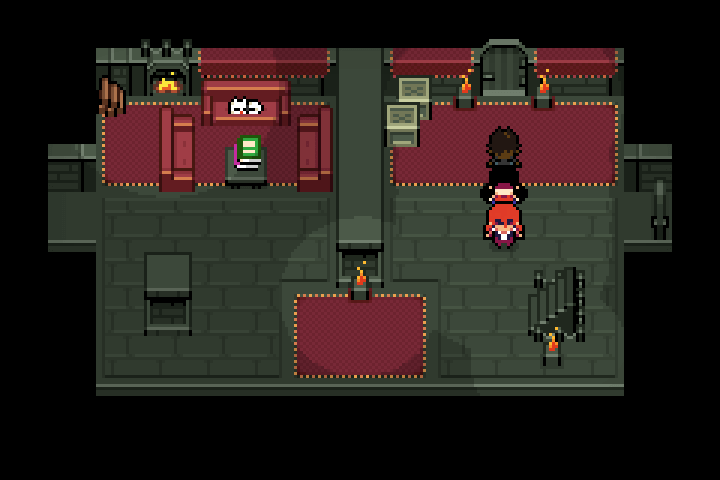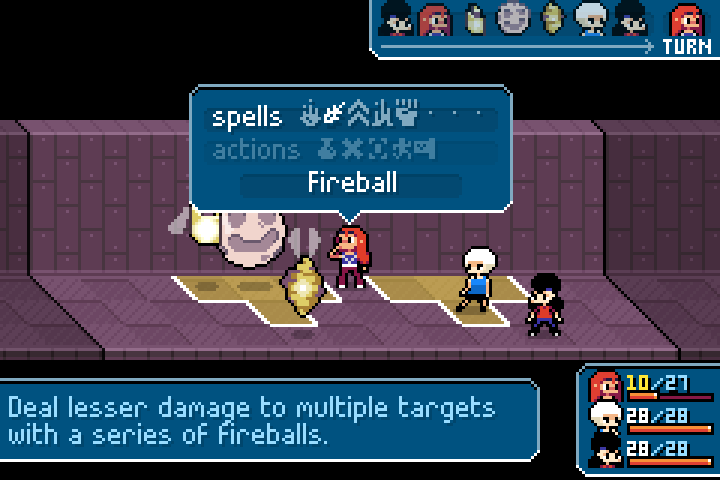In many of the video games I’ve played, depictions of schools have always felt a bit too close to home. Attending classes, taking exams, and dealing with murderous teddy bears are all common things (okay, maybe not that one), but if I were to have a dream school scenario, it would be to attend a magic school, and not too many games other than the Mana Khemia subseries let you do that. Ikenfell doesn’t quite give you the chance to live out your wizard school fantasies, but it does open the doors to a world where magic is real while capturing the wonder and mystery of an academy that has some dark secrets to hide.
When her sister fails to return home from the magic school of Ikenfell one summer, Maritte, an Ordinary who is unable to use magic, heads there to find out what has happened to the school’s star pupil. Soon after she arrives, she gains pyromancy abilities and joins up with a few of the students to uncover the academy’s secrets and find out the truth behind why the school has been shut off from the rest of the world.
Ikenfell feels like a cozy mix between a Game Boy Advance game and a 1980s coming-of-age comedy. It’s evocative of the kind of games you’d stay up late at night with as a kid and play while hidden under the duvet. From the vibrant use of colour to the expressive sprite animations/character portraits, and even some catchy music and pop vocal tracks (composed by some of the people behind Steven Universe’s soundtrack), the game is like a warm hug throughout. Right down to the gameplay, Ikenfell is happy to not venture far out of its comfort zone. And that’s absolutely okay.

The game is split into eight chapters, with new parts of the school unlocking as your progress. Each area is a new dungeon, with puzzles to solve and enemies to fight. Most are just different rooms or locations within the school, like a library, an alchemy lab, or a garden, with multiple rooms and corridors to venture through. The similarities make the dungeons feel a bit repetitive, but most of them don’t outstay their welcome. The puzzles, which involve anything from flipping switches to playing short minigames, do help to add variety, and there are some hidden rooms in each area holding gems that you can trade for rare accessories.
What makes Ikenfell stand out is the lighthearted, quirky tone it sustains. It accomplishes this through the amusing characters that perfectly capture the joy of being a mischievous kid at school and twee humour. It’s a very positive game, but sometimes a bit sickly sweet. Still, this sweetness does help balance out some of the more difficult moments where some of the group deal with mental health issues and struggles. I found the scenes where a certain character experiences panic attacks to be understated and poignant; seeing how the other party members struggle to deal with this but also learn to help was really touching and sensitively addressed. Some of the resolutions to these arcs feels a bit undercut by just how saccharine the tone gets, but the heart and empathy on display is undeniable. If you’re concerned about any of these scenes being upsetting, there’s an option in the menu to turn on content warnings, which will pop up just before a scene or section of the game to warn you of an uncomfortable topics. It’s a fantastic accessibility feature that I’d love to see implemented in more games going forward.
It’s also extremely queer friendly, with characters of all identities integrated into the world naturally. Their identities and sexualities are treated as they should be, completely normally and in a way that celebrates and uplifts them. It’s also one of the first games where I’ve seen use of ze/zir pronouns for a character, one who holds a position of authority and plays a key role in parts of the story, which is fantastic. The more we see this kind of representation in video games, the more it helps people understand who we are. There’s some clumsy internet-age dialogue, but in most cases it helped make the character’s relationships more endearing to me.

Gameplay differs most from other games in combat, which can be a little bit challenging but ultimately rewarding to master. Ikenfell mixes grid-based tactical combat with traditional turn-based gameplay. Three party members will be placed on one end of a grid with the enemies on the other, and you’ll each take it in turns to move across the grid and take actions. A character can only move so many squares in any direction at a given time, but you can move and make an action, such as using an item or a skill, in the same turn.
The key to combat is timing your button presses perfectly, à la Paper Mario or Mario & Luigi. Every skill requires different timing to deal the most damage, and sometimes the damage difference can be pretty staggering. It can be a bit finicky mastering the timing of many of these skills, and most have a narrow frame to execute them perfectly. Skills range from shooting fireballs at your enemies and pressing perfectly when the fireball hits them to laying a trap on a square that damages the enemy (and even you) when stepped on. You can follow this same process to defend against enemy attacks and reduce damage, but they suffer from the same problems as your attacks even if you can eventually memorise enemy animation patterns. Knowing what tile to move to, what skill to use when, and mastering button presses added an extra layer of strategy that I find some turn-based battle systems to be lacking.
Perhaps a consequence of these different systems, the pace of nearly all of the battles in the game is incredibly slow. Some normal enemy encounters, if you’re particularly unlucky with button presses, definitely outstay their welcome. Many of the boss fights go through similar phases of having multiple forms and spitting out more enemy mobs the later into the fight you get. It’s annoying to simply fight waves and waves of the same enemies, and it distracts from the actual fun challenge of the main boss. Some items and later game skills such as regen make these a lot more bearable, but battles feeling like a war of attrition impedes the more fun aspects of the strategy.
As the cold nights draw in, playing Ikenfell is like huddling round a little cauldron of warmth. It makes important steps in queer representation that I wish more games would do, and discusses mental health in worthwhile ways. It does all of this under a pleasant, charming veneer with fun combat and cute visuals, and while the game never does anything spectacular, the tone and addictive gameplay will definitely cast a spell on you.



